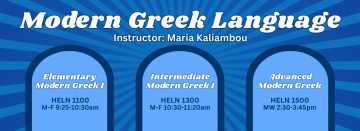Fall 2025 Courses

Elementary Modern Greek I
Instructor: Maria Kaliambou
HELN 1100
Monday-Friday 9:25-10:15
An introduction to modern Greek, with emphasis on oral expression. Use of communicative activities, graded texts, written assignments, grammar drills, audiovisual material, and contemporary documents. In-depth cultural study.
Intermediate Modern Greek II
Instructor: Maria Kaliambou
HELN 1300
Monday-Friday 10:30-11:20
Further development of listening, speaking, reading, and writing skills in modern Greek. Presentation of short research projects related to modern Greece.
Advanced Modern Greek
Instructor: Maria Kaliambou
HELN 1500
Monday, Wednesday 2:30-3:45
Advanced language course intended to further develop reading, writing, speaking, and listening skills, while sharpening students’ sensitivity toward modern Greek culture.

The Olympic Games, Ancient & Modern
Instructor: George Syrimis
HELN 3000/HIST 3242
Wednesday 9:25-11:15
Introduction to the history of the Olympic Games from antiquity to the present. The mythology of athletic events in ancient Greece and the ritual, political, and social ramifications of the actual competitions. The revival of the modern Olympic movement in 1896, the political investment of the Greek state at the time, and specific games as they illustrate the convergence of athletic cultures and sociopolitical transformations in the twentieth century.

The Olympic Games, Ancient & Modern
Instructor: George Syrimis
HELN 2380/WGSS 2233
Thursday 1:30-3:20
The course examines the cinematic production of Greece in the last fifteen years or so and looks critically at the popular term “weird Greek wave” applied to it. Noted for their absurd tropes, bizarre narratives, and quirky characters, the films question and disturb traditional gender and social roles, as well as international viewers’ expectations of national stereotypes of classical luminosity–the proverbial “Greek light”–Dionysian exuberance, or touristic leisure. Instead, these works frustrate not only a wholistic reading of Greece as a unified and coherent social construct, but also the physical or aesthetic pleasure of its landscape and its ‘quaint’ people with their insistence on grotesque, violent, or otherwise disturbing images or themes (incest, sexual otherness and violence, aggression, corporeality, and xenophobia). The course also pays particular attention on the economic and political climate of the Greek financial crisis during which these films are produced and consumed and to which they partake.